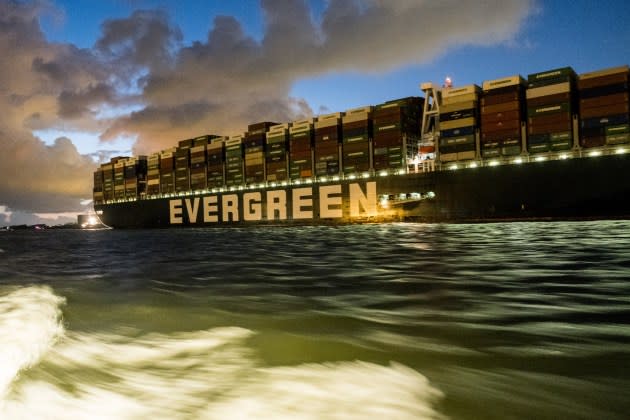Amazon Expects No Impact From Red Sea Rerouting, Ikea Warns of Product Shortages

The Houthi attacks on commercial vessels traversing the Bab al-Mandeb Strait are resulting in more ships diverting course from the Red Sea around southern Africa’s Cape of Good Hope—spurning a major global trade artery in the Suez Canal and potentially tacking on two weeks to transit times.
As of Thursday, 129 vessels have been rerouted away from the Red Sea, with an additional 28 ships opting to stay stationary and try to wait out the conflict, according to analysis from Project44.
More from Sourcing Journal
DHL-Teamsters Strike Ends as Amazon Workers Prep Stoppage in Spain
Panama Canal Backlog Sparks Rebound for West Coast Container Volume
One U.S. logistics giant, C.H. Robinson, said in a Friday client advisory that its ocean freight partners had rerouted more than 25 vessels, and that the number would continue to grow due to the war risks in the Red Sea, as well as the drought-driven backlog in the Panama Canal.
Matt Muenster, chief economist at transportation and shipping solutions provider, Breakthrough, told Sourcing Journal that of all the vessels traveling through the canal being rerouted, container shipping will see the biggest impact.
“Container shipping has the greatest share of their industry goods—about 20 percent of container shipments flow through the Red Sea and the Suez Canal, versus the 10 percent of tankers, refined products and crude oil,” Muenster said.
Retailers, which stand to feel the pain of delivery delays and higher freight rates, have largely played coy regarding the developments.
Thus far, only Ikea has acknowledged the potential impacts, saying that the situation in the Suez Canal will result in delays and may cause availability shortages for certain products.
“We are in close dialogue with our transportation partners to ensure the safety of people working in the Ikea value chain and to take all the necessary precautions to keep them safe. This is our main priority,” an Ikea spokesperson said. “In the meantime, we are evaluating other supply options to secure the availability of our products, and we continue to monitor the situation closely going forward.”
Ikea does not own any container vessels, and the home retailer’s transportation partners manage all its shipments.
On the other hand, Amazon does not anticipate impact its customers and is continuing to monitor the situation, a representative for the e-commerce giant told Sourcing Journal.
Similarly, a Uniqlo representative said there has been no impact on the business yet, but echoed that it would be monitoring the situation closely.
Robert Khachatryan, CEO of freight forwarder Freight Right Global Logistics, expects shippers to be impacted mainly via increased freight costs, particularly since the ocean freight industry has sought to drive up profitability after rates have fallen drastically over the past two years. He expects more blank sailings to limit supply of shipping space on the seas, which in theory, increases prices.
“We are in a year of bad ocean freight demand,” Khachatryan said. “The Suez situation is very convenient for ocean carriers to say, ‘Sorry, this route is too risky and we have to take the longer route, and therefore the rates must go up.’ Before this Houthi rebel situation even started, that was exactly the strategy carriers were implementing—limit sailings and make them longer.”
Muenster said that the container shipping companies at large were likely to be more prepared for mass reroutings, especially given the supply chain bottlenecks during the Covid-19 pandemic, when consumers quickly shifted their spending habits for goods and production was disrupted throughout Asia.
“The 10-to-15-day difference in transit times that’s expected is nothing in comparison to the pandemic disruptions in transit times,” Muenster said. “The ability of container lines to reallocate capacity goes a long way to alleviating stress in markets such as this. They have capacity that has been on the sidelines. The fact that the industry is very consolidated—many of the major companies that are moving goods are doing so across most major trade lanes—creates flexibility that doesn’t present an immediate solution, but certainly doesn’t seem to let these challenges prolong in the market.
Suez Canal delays ‘more of a European problem’
Europe is expected to be hit the most, with trade lanes between it and Asia comprising nearly 28 percent of the total routes that leverage the Suez Canal, according to Project44 data. This could lead to an outsized on brands operating in the region.
A research note from Bank of America highlighted that Crocs, Levi Strauss & Co., PVH Corp. and Tapestry were among the only specialty retailing companies who called out the Suez Canal as an issue in 2021, when the Ever Given container ship got stuck in the waterway for six days.
All four of those businesses have larger European operations, which will likely be impacted more due to the Asia-to-Europe trade lane, the note said.
Sourcing Journal reached out to Crocs, Levi Strauss & Co., PVH and Tapestry.
Elsewhere in Europe, the Sweden-based H&M said it wouldn’t go into details about the potential impacts, but downplayed the idea of disruption.
“We have a lot of experience in working with logistics and cannot see that we at this time will have any significant disruptions in the shipment of our collections,” an H&M spokesperson told Sourcing Journal.
Identifying the Suez Canal situation as “more of a European problem,” Khachatryan said the Panama Canal backlog is the main factor that has exacerbated the issues for American companies.
“Only very recently, some carriers started routing ships through the Suez due to the delays in Panama, because it’s not that much better of an option,” Khachatryan said. “If you take the Suez, it’s a couple weeks longer transit time anyway. It’s not clear that it’s an improvement to begin with, and that’s why the Suez has not been a big part of the Panama Canal solution.”

